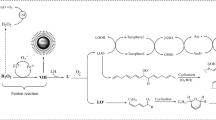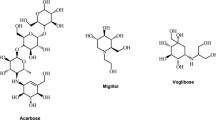Abstract.
The health benefits of green tea and its main constituent (-)-epigallocatechin gallate [(-)-EGCG] have been widely supported by results from epidemiological, cell culture, animal and clinical studies. On the other hand, there are a number of issues, such as stability, bioavailability and metabolic transformations under physiological conditions, facing the development of green tea polyphenols into therapeutic agents. We previously reported that the synthetic peracetate of (-)-EGCG has improved stability and better bioavailability than (-)-EGCG itself and can act as pro-drug under both in vitro and in vivo conditions. Analogs of catechins have been synthesized and their structure activity relationship provides an understanding to the mechanism of proteasome inhibition. Metabolic methylation of catechins leading to methylated (-)-EGCG may alter the biological activities of these compounds.
Similar content being viewed by others
Author information
Authors and Affiliations
Corresponding author
Additional information
Received 2 June 2008; accepted 19 June 2008
Rights and permissions
About this article
Cite this article
Huo, C., Wan, S.B., Lam, W.H. et al. The challenge of developing green tea polyphenols as therapeutic agents. Inflammopharmacol 16, 248–252 (2008). https://doi.org/10.1007/s10787-008-8031-x
Published:
Issue Date:
DOI: https://doi.org/10.1007/s10787-008-8031-x




